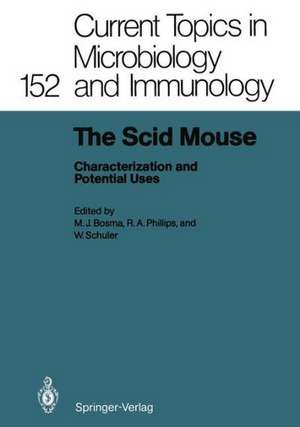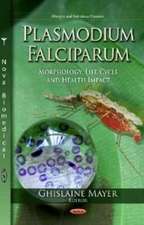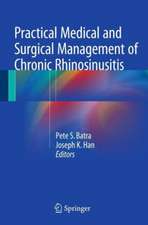The Scid Mouse: Characterization and Potential Uses: Current Topics in Microbiology and Immunology, cartea 152
Editat de Melvin J. Bosma, Robert A. Phillips, Walter Schuleren Limba Engleză Paperback – 6 dec 2011
Din seria Current Topics in Microbiology and Immunology
- 18%
 Preț: 962.03 lei
Preț: 962.03 lei - 5%
 Preț: 1123.13 lei
Preț: 1123.13 lei - 5%
 Preț: 1085.95 lei
Preț: 1085.95 lei -
 Preț: 499.77 lei
Preț: 499.77 lei - 5%
 Preț: 967.81 lei
Preț: 967.81 lei - 18%
 Preț: 1118.62 lei
Preț: 1118.62 lei - 5%
 Preț: 717.00 lei
Preț: 717.00 lei - 5%
 Preț: 712.97 lei
Preț: 712.97 lei - 5%
 Preț: 709.51 lei
Preț: 709.51 lei - 5%
 Preț: 709.51 lei
Preț: 709.51 lei - 5%
 Preț: 721.19 lei
Preț: 721.19 lei - 5%
 Preț: 359.78 lei
Preț: 359.78 lei - 5%
 Preț: 711.88 lei
Preț: 711.88 lei - 5%
 Preț: 774.81 lei
Preț: 774.81 lei - 15%
 Preț: 640.06 lei
Preț: 640.06 lei - 5%
 Preț: 717.00 lei
Preț: 717.00 lei - 5%
 Preț: 360.34 lei
Preț: 360.34 lei - 5%
 Preț: 707.69 lei
Preț: 707.69 lei - 5%
 Preț: 717.56 lei
Preț: 717.56 lei - 5%
 Preț: 716.28 lei
Preț: 716.28 lei - 5%
 Preț: 717.20 lei
Preț: 717.20 lei - 5%
 Preț: 711.32 lei
Preț: 711.32 lei - 5%
 Preț: 711.88 lei
Preț: 711.88 lei - 5%
 Preț: 718.29 lei
Preț: 718.29 lei - 5%
 Preț: 709.51 lei
Preț: 709.51 lei - 5%
 Preț: 369.84 lei
Preț: 369.84 lei - 5%
 Preț: 712.25 lei
Preț: 712.25 lei - 5%
 Preț: 716.45 lei
Preț: 716.45 lei - 5%
 Preț: 706.60 lei
Preț: 706.60 lei - 5%
 Preț: 711.52 lei
Preț: 711.52 lei - 5%
 Preț: 713.54 lei
Preț: 713.54 lei - 5%
 Preț: 720.47 lei
Preț: 720.47 lei - 5%
 Preț: 725.42 lei
Preț: 725.42 lei - 5%
 Preț: 708.06 lei
Preț: 708.06 lei - 5%
 Preț: 713.70 lei
Preț: 713.70 lei - 5%
 Preț: 705.83 lei
Preț: 705.83 lei - 5%
 Preț: 710.96 lei
Preț: 710.96 lei - 5%
 Preț: 723.93 lei
Preț: 723.93 lei - 5%
 Preț: 707.69 lei
Preț: 707.69 lei - 5%
 Preț: 715.35 lei
Preț: 715.35 lei - 5%
 Preț: 709.87 lei
Preț: 709.87 lei - 5%
 Preț: 359.05 lei
Preț: 359.05 lei - 5%
 Preț: 374.20 lei
Preț: 374.20 lei - 15%
 Preț: 635.31 lei
Preț: 635.31 lei - 5%
 Preț: 707.86 lei
Preț: 707.86 lei - 5%
 Preț: 721.96 lei
Preț: 721.96 lei - 15%
 Preț: 632.88 lei
Preț: 632.88 lei - 15%
 Preț: 632.05 lei
Preț: 632.05 lei - 15%
 Preț: 642.83 lei
Preț: 642.83 lei
Preț: 717.00 lei
Preț vechi: 754.74 lei
-5% Nou
Puncte Express: 1076
Preț estimativ în valută:
137.21€ • 148.99$ • 115.26£
137.21€ • 148.99$ • 115.26£
Carte tipărită la comandă
Livrare economică 22 aprilie-06 mai
Preluare comenzi: 021 569.72.76
Specificații
ISBN-13: 9783642749766
ISBN-10: 3642749763
Pagini: 280
Ilustrații: XII, 263 p.
Dimensiuni: 170 x 242 x 15 mm
Greutate: 0.45 kg
Ediția:Softcover reprint of the original 1st ed. 1989
Editura: Springer Berlin, Heidelberg
Colecția Springer
Seria Current Topics in Microbiology and Immunology
Locul publicării:Berlin, Heidelberg, Germany
ISBN-10: 3642749763
Pagini: 280
Ilustrații: XII, 263 p.
Dimensiuni: 170 x 242 x 15 mm
Greutate: 0.45 kg
Ediția:Softcover reprint of the original 1st ed. 1989
Editura: Springer Berlin, Heidelberg
Colecția Springer
Seria Current Topics in Microbiology and Immunology
Locul publicării:Berlin, Heidelberg, Germany
Public țintă
ResearchCuprins
I. General Phenotype/Cellular Characterization.- The scid Mutation: Occurrence and Effect.- Pleiotropic Effects of the scid Mutation: Effects on Lymphoid Differentiation and on Repair of Radiation Damage.- Analysis of Lymphoid Population in Scid Mice; Detection of a Potential B Lymphocyte Progenitor Population Present at Normal Levels in Scid Mice by Three Color Flow Cytometry With B220 and S7.- Phenotype and Differentiation Stage of Scid Mouse Thymocytes.- Growth Requirements of B Lineage Lymphocytes From Scid and Normal Mice.- Defect of Scid Mouse Revealed in In Vitro Culture Systems.- Natural Killer Cells and Their Precursors in Mice With Severe Combined Immunodeficiency.- II. General Phenotype/Molecular Characterization.- Nature of the scid Defect: A Defective VDJ Recombinase System.- Rearrangement of T Cell Receptor Delta Genes in Thymus of Scid Mice.- Abnormal V(D)J Recombination in Murine Severe Combined Immune Deficiency: Absence of Coding Joints and Formation of Alternative Products.- The scid Mutation Disrupts Gene Rearrangement at the Rejoining of Coding Strands.- The Effect of the scid Mutation on Mechanism and Control of Immunoglobulin Heavy and Light Chain Gene Rearrangement.- III. Introduction of Functional Ig or TCR Transgenes.- The Utilization of the scid Mutation in the Study of T Cell Development.- Transgenic Scid Mice With a Functionally Rearranged Immunoglobulin Heavy Chain Gene.- IV. Leaky Phenotypes.- T Cell Leakiness in Scid Mice.- Limited Clonal Diversity of Serum Immunoglobulin in Leaky Scid Mice.- Pauciclonal B Cell Involvement in Production of Immunoglobulin in Scid Ig+ Mice.- V. Potential Uses: Engraftment with Syngeneic Mouse Cells.- Reconstitution of Scid Mice by Injection of Varying Numbers of Normal Fetal Liver Cells into Scid Neonates.-Reconstitution of Lymphocyte Subsets in Scid Mice by Transplantation of Fetal Primordia.- Use of the Scid Mouse Tranplantation System in Studies of Lymphocyte Differentiation.- The Scid Mouse as a Model to Identify and Quantify Myeloid and Lymphoid Stem Cells.- VI. Potential Uses: Engraftment with Human Tissues and Cells.- The Scid-hu Mouse: Current Status and Potential Applications.- Studies of HIV Infection and the Development of Epstein-Barr Virus-Related B Cell Lymphomas Following Transfer of Human Lymphocytes to Mice With Severe Combined Immunodeficiency.- Human Lung Tumors, Patients’ Peripheral Blood Lymphocytes and Tumor Infiltrating Lymphocytes Propagated in Scid Mice.- Adoptive Transfer of Human Peripheral Blood Lymphocytes (PBL) in Scid Mice.- Establishment of Assays for Human Hematopoietic Cells in Immune Deficient Mice.- VII. Potential Uses: Model For Studies of Immune Function.- Scid Mice in Reproductive Biology.- T Cell-Independent Macrophage Activation in Scid Mice.- Pneumocystis carinii Pneumonia in scid/scid Mice.- Immunobiology of Bone Marrow Transplantation: Studies Using Scid Mice.- Growth of Human Tumors in Immune-Deficient scid Mice and nude Mice.










